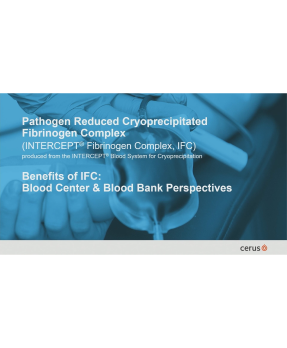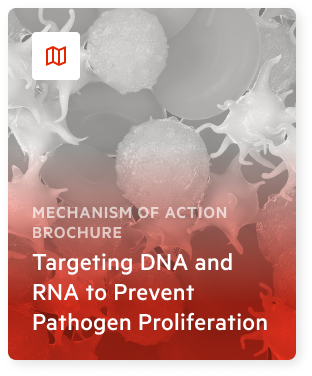INTERCEPT goes beyond to protect patients*, improve availability, and deliver value.
The INTERCEPT Blood System protects patients through broad-spectrum transfusion-transmitted infection (TTI) risk reduction with the inactivation of bacteria, viruses, protozoans, and leukocytes.1,2 Blood components are available earlier, resulting in fresher platelets that may be transfused sooner,3,4 and improving availability of fibrinogen† and other vital clotting factors when minutes matter.5 Economic and operational efficiencies are gained through waste and cost reduction associated with testing and TTI risks.6-8
Protect Patients*
Improve Availability
Deliver Value
Why Blood Matters, Cal Miller’s Story
Listen as Dash Miller tells his brother Cal’s story, sharing the impact that the INTERCEPT Blood System had in delivering safe blood products in Cal’s time of need.
What’s New
Benefits of IFC:
Blood Center & Blood Bank Perspectives
In this webinar, Dr. Patricia Kopko, Director of Transfusion Medicine at the University of California, San Diego, and Austin Dyches, Director of Biologics Manufacturing at OneBlood, share their institutions’ experience with IFC. They discuss how IFC benefits blood center production, improves hospital efficiencies (shortening turnaround times and minimizing wastage), and impacts patient care with immediate availability† due to its 5-day post thaw shelf life, improving patient access to fibrinogen supplementation during hemorrhage at their institutions.
Resources
Learn More
Find out more about the INTERCEPT Blood System.
*There is no pathogen inactivation process that has been shown to eliminate all pathogens. Certain non-enveloped viruses (e.g., HAV, HEV, B19 and poliovirus) and Bacillus cereus spores have demonstrated resistance to the INTERCEPT process. For a full list of pathogens, please refer to package inserts. †INTERCEPT Fibrinogen Complex is available for immediate use for up to 5 days when stored thawed; and when stored frozen requires thawing prior to use.
- The INTERCEPT Blood System for Platelets Package Insert, Cerus Corporation.
- INTERCEPT Blood System for Cryoprecipitation for the manufacturing of Pathogen Reduced Cryoprecipitated Fibrinogen Complex Package Insert.
- Collier, T. and Chrebtow , V. “Impact of Pathogen Reduction (PR) vs. LVDS Testing on Platelet Availability: A Study Based on Real-World Experience.” AABB 2022. Poster P-IV-8.
- Prichard, A.B., et al. “Comparing Usable Shelf-Life of Pathogen Reduced Platelets vs. LVDS Screened Platelets”. AABB 2022. Poster P-IV-2.
- Meyer DE, et al. The Journal of Trauma and Acute Care Surgery 2017;83:19-24.
- Harm SK, et al. Transfusion. 2018 Apr; 58(4):938-942.
- Ruby KN, et al. Transfusion. 2018 Jul; 58(7):1665-1669.
- Cerus Corporation. (2022) “Assessing Impact of INTERCEPT Fibrinogen Complex (IFC) on Wastage and Massive Transfusion Protocols (MTPs)”. [Case Study].




